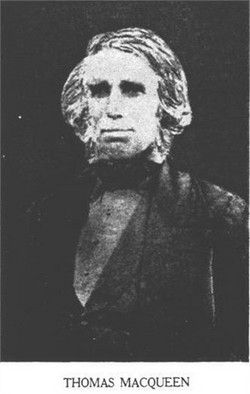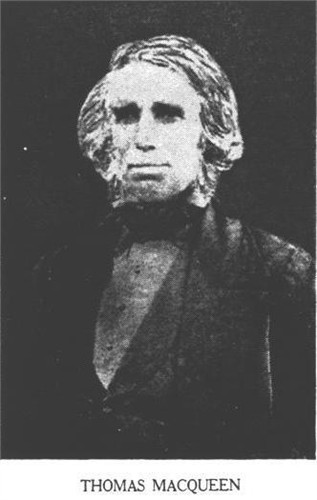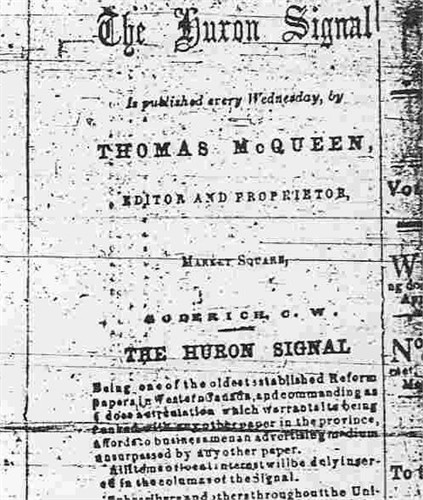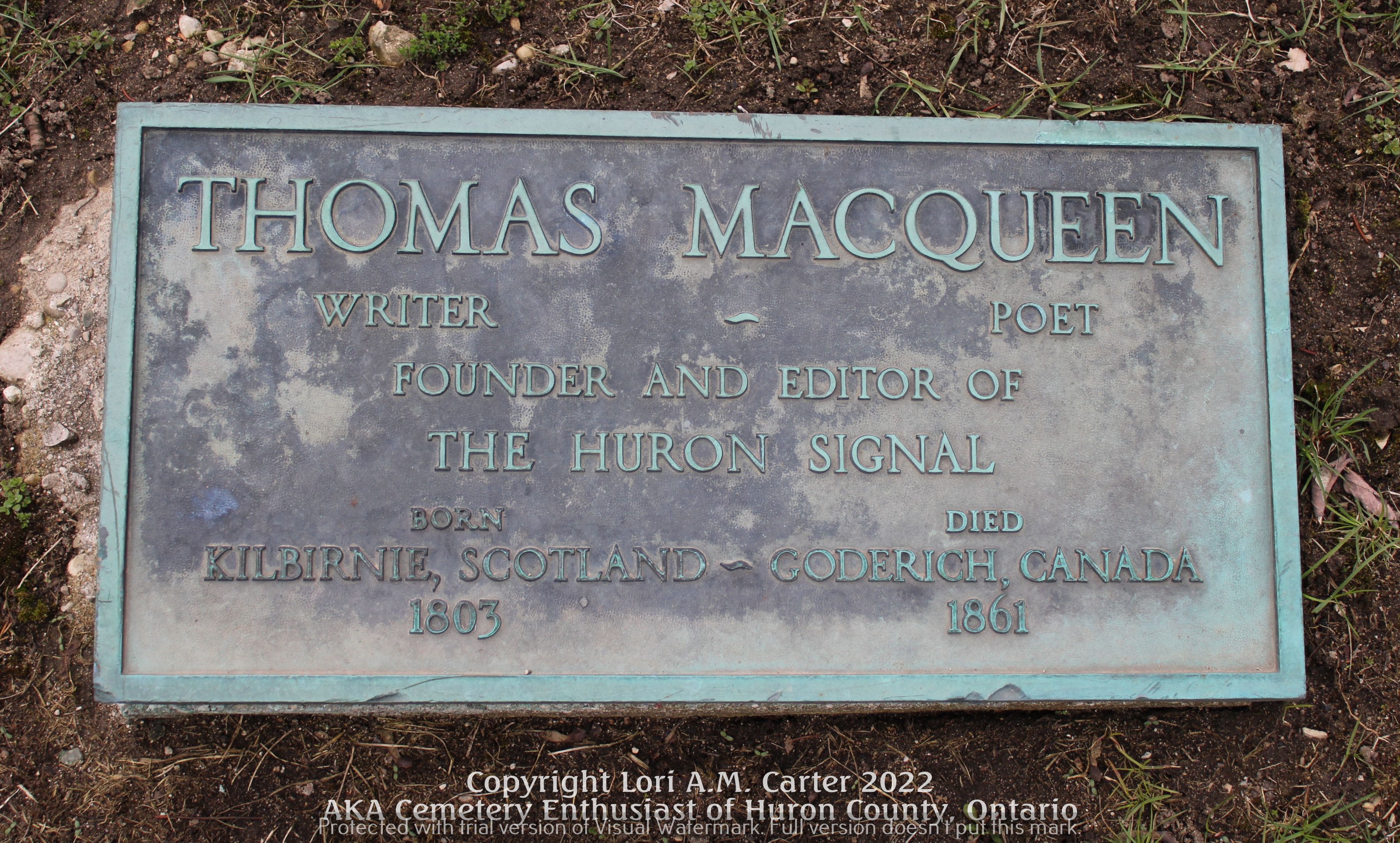Thomas McQueen was born in Ayrshire, Scotland* to Osborn and Elizabeth (Copeland) McQueen.
He immigrated to Canada living with his sister, Mary Ann (McQueen) Storie, and her family for a short time in Renfrew, Ontario.
Known in Scotland as a poet he continued his work in Canada expanding into writing prose in his newspaper. He became the Founder and Editor of the Huron Signal in Goderich, Ontario. He published the paper from 1848 until his death in 1861.
Ref: Canadian Archives
~~~~~~~~~~
The following is extracted from a tribute to his memory, written by W. W. Smith, Esq., editor of the Owen Sound Times, July 1861.
"Mr. McQueen, before his emigration to Canada, was somewhat known in Scotland as a Poet. Three little volumes, published between 1836 and 1850, were so well received, that they have run thro' three editions each. While finding much to commend in his poetry, we cannot help regretting it took so political a turn; and that Nature, the inexhaustible field of the rural poet, was only courted at intervals. Some twelve years ago, Mr. McQueen commenced the publication of the Signal newspaper at Goderich. Afterwards, he removed to Hamilton, and started a Reform journal, The Canadian. Not apparently succeeding so well in Hamilton as at Goderich, he recommenced the Signal at the latter place. Mr. McQueen was a vigorous writer, and a forcible though not a polished speaker. Some of his Canadian pieces in verse, which are not numerous, are very beautiful. Of these, we remember "Our own broad Lake," and others. He entered heartily, though too late in life to effect much with his own pen, into the plans of those who were and are seeking to established and build up a native literature among us. Some years ago, he ended an editorial on the subject, with the earnest appeal, "Will nobody write a few songs for Canada?"--"Owen Sound Times," July, 1861.
~~~~~~~~~~
BIO of Thomas McQueen. by H. J. M. Johnston ( Dictionary of Canadian Biography Online )
2000 , Ontario
McQUEEN, THOMAS, stonemason, journalist, politician, and poet; b. 9 Oct. 1803 in the parish of Kilbirnie, Ayrshire, Scotland; he married and had several children; d. 26 June 1861 at Goderich, Canada West.
Thomas McQueen's father was a labourer in a rural parish 20 miles southwest of Glasgow, and McQueen received little schooling because he was required to work. At the age of nine an accident left him convalescent for a long period and lame for the rest of his life. He developed an interest in books, although his reading never led him away from his origins. He went to work as a stonemason at 14 or 15, during years of intense labour unrest when working class journalism became established. Stimulated by the agitation for parliamentary reform in the 1820s and early 1830s, he wrote for the periodical press and lectured on the rights of the working man. He also published three volumes of poetry – much of a political nature – and issued a weekly series of essays and lectures on political economy, education, and morals.
In 1842 McQueen immigrated to Canada West and settled near Pakenham in the Bathurst District, immediately north of an established settlement of Glasgow weavers and other Scots. Although the rocky land of much of the district was ill suited to agriculture, he was impressed by the rent-free, cheap, and fertile land available elsewhere in Upper Canada and contrasted the settler's opportunities to prosper with "The revolting condition of the five-farthing per-yard weaver" in Britain whom the industrial system had "Driven within the precincts of a lingering starvation." From 1842 to 1846 he worked as a mason throughout the Pakenham area. His journalistic instincts were not long in surfacing, and he began to contribute regularly to the Bathurst Courier, vigorously advocating secular education and deriding the claims of the Church of England.
In 1847 Malcolm Cameron, a Sarnia merchant and radical Grit member of the assembly for Lanark, offered McQueen £100 a year to edit a paper in the newly settled Huron Tract. McQueen did not accept this offer, but in 1848 he moved to Goderich and on 4 February the first issue of the Huron Signal appeared with McQueen as editor and Charles Dolsen as publisher.
When in May 1849 the Tories burned the Parliament buildings at Montreal, he wrote that "Toryism has been the curse of the civilized world -- the meaning of it is to exalt and pamper a few individuals in luxuriant indolence at the expense of the sweat and toil and degradation of the great mass of industrious mankind". He lashed out at the connection between war and illiteracy, between colonialism and the Church. He was a bitter opponent of child labour, the ruthless colonial rape of India, and the hypocrisy of the Christian church of the day which supported these evils.
McQueen saw his principal task as the revival of the Reform party in Huron County, represented in the assembly by William Cayley, a Tory lawyer from Toronto and a nephew of Bishop John Strachan. Huron was divided between conservative Ulstermen and reform-minded dissenting Scots, but the Reformers were fragmented and disorganized and in the Signal McQueen set out to give them a point of focus. He urged the farmers of Huron to elect "one of your own class," and denounced toryism as "The curse of the civilized world – the liberal meaning of it is to exalt and pamper a few individuals in luxuriant indolence, at the expense of the sweat and toil and degradation of the great mass of industrious mankind." McQueen's triumph came in 1851 when Malcolm Cameron defeated Cayley in Huron. By this time, as McQueen put it, he was "Tired of living in the extreme verge of civilization in Goderich." In 1852 he took the editorship of a new Reform journal, the Hamilton Canadian, at £200 a year. During the next two years the Canadian developed from a weekly to a tri-weekly and McQueen acquired a province-wide reputation as an advocate of reform and temperance. Early in 1854 Francis Hincks asked him to edit the Montreal Pilot and Journal of Commerce at £250 a year and he had offers from newspapers in Halton County, Belleville, and elsewhere. But he chose to return that year to Goderich and the Huron Signal.
In the election of the same year McQueen ran against Cayley on a radical Grit platform, promising to seek the abolition of the clergy reserves, separate schools, and seigneurial tenure in Lower Canada, and to work for reciprocity with the United States and a union of the British North American provinces. He was defeated by a strong Conservative turnout in the town of Goderich.
He sought political office under the Reform banner in Huron County in 1854 but was defeated by a nephew of the notorious Family Compact chieftain Bishop John Strachan. The Huron Signal (now the Signal-Star) was first published on the Square but later moved to North Street where it remained until it merged with the Goderich Star.
After 1854 McQueen took a special interest in evaluating agricultural methods and educating farmers in proper drainage, rotation of crops, drill husbandry, fencing, and the use of fertilizers and machinery. He bought an 800-acre property in Huron County and continued as editor of the Signal until his death in 1861.
His poetry was inspired by Robert Burns. Margaret Fairley dubbed him the "Socialist Poet of Upper Canada". Despite his early fame, he is unheralded, without a single marker in town or at his last home at "Signalfield", a few miles south of Goderich.
*Ayreshire has since been subdivided up into North, South, and East Ayreshire.
~~~~~~~~~~
Biography:
MACQUEEN, Thomas (1803-61: DCB)
The son of a farm labourer, Osborne Macqueen (or McQueen), and his wife, Elizabeth (Copeland), he was born at Kilbirnie, Ayrshire. He had limited education and became lame at about the age of ten because of an accident. He worked as a stonemason but was determined to make a living by writing. In 1829 he married Mary Mitchell; they were to have at least six children. His books were popular and he began to make a name for himself particularly as a poet; in addition to the two listed in the database, his works include The Village Pestilence (1835: 8 pages), A Few Friendly Observations on Morals and Politics (1838), and The Moorland Minstrel (1840). In 1842 the family, with Macqueen's sister and her family, emigrated to Upper Canada where they settled first near Pakenham. There he worked as a mason while also contributing to the Bathurst Courier. In 1848 they moved to Goderich where he was the inaugural editor of the Huron Signal, a reformist newspaper. They spent two years (1852-54) in Hamilton where he edited the Hamilton Canadian before returning to Goderich and the Signal. He became known for his vigorous prose style but, aside from a very few poems, he gave up writing verse—despite asking, in one editorial, "Will nobody write a few songs for Canada?" In the 1854 election he ran for the Liberal party but was defeated. During his final years he advocated reform of agricultural methods. He died at Goderich and is buried in Maitland Cemetery there. (DCB 30 Apr 2020; ancestry.co.uk 30 Apr 2020; James L. Talman, "Three Scottish-Canadian Editor Poets," Canadian Historical Review 28 (1947): 166-77)
Ref: https://jacksonbibliography.library.utoronto.ca/author/details/macqueen-thomas/9286
Thomas McQueen was born in Ayrshire, Scotland* to Osborn and Elizabeth (Copeland) McQueen.
He immigrated to Canada living with his sister, Mary Ann (McQueen) Storie, and her family for a short time in Renfrew, Ontario.
Known in Scotland as a poet he continued his work in Canada expanding into writing prose in his newspaper. He became the Founder and Editor of the Huron Signal in Goderich, Ontario. He published the paper from 1848 until his death in 1861.
Ref: Canadian Archives
~~~~~~~~~~
The following is extracted from a tribute to his memory, written by W. W. Smith, Esq., editor of the Owen Sound Times, July 1861.
"Mr. McQueen, before his emigration to Canada, was somewhat known in Scotland as a Poet. Three little volumes, published between 1836 and 1850, were so well received, that they have run thro' three editions each. While finding much to commend in his poetry, we cannot help regretting it took so political a turn; and that Nature, the inexhaustible field of the rural poet, was only courted at intervals. Some twelve years ago, Mr. McQueen commenced the publication of the Signal newspaper at Goderich. Afterwards, he removed to Hamilton, and started a Reform journal, The Canadian. Not apparently succeeding so well in Hamilton as at Goderich, he recommenced the Signal at the latter place. Mr. McQueen was a vigorous writer, and a forcible though not a polished speaker. Some of his Canadian pieces in verse, which are not numerous, are very beautiful. Of these, we remember "Our own broad Lake," and others. He entered heartily, though too late in life to effect much with his own pen, into the plans of those who were and are seeking to established and build up a native literature among us. Some years ago, he ended an editorial on the subject, with the earnest appeal, "Will nobody write a few songs for Canada?"--"Owen Sound Times," July, 1861.
~~~~~~~~~~
BIO of Thomas McQueen. by H. J. M. Johnston ( Dictionary of Canadian Biography Online )
2000 , Ontario
McQUEEN, THOMAS, stonemason, journalist, politician, and poet; b. 9 Oct. 1803 in the parish of Kilbirnie, Ayrshire, Scotland; he married and had several children; d. 26 June 1861 at Goderich, Canada West.
Thomas McQueen's father was a labourer in a rural parish 20 miles southwest of Glasgow, and McQueen received little schooling because he was required to work. At the age of nine an accident left him convalescent for a long period and lame for the rest of his life. He developed an interest in books, although his reading never led him away from his origins. He went to work as a stonemason at 14 or 15, during years of intense labour unrest when working class journalism became established. Stimulated by the agitation for parliamentary reform in the 1820s and early 1830s, he wrote for the periodical press and lectured on the rights of the working man. He also published three volumes of poetry – much of a political nature – and issued a weekly series of essays and lectures on political economy, education, and morals.
In 1842 McQueen immigrated to Canada West and settled near Pakenham in the Bathurst District, immediately north of an established settlement of Glasgow weavers and other Scots. Although the rocky land of much of the district was ill suited to agriculture, he was impressed by the rent-free, cheap, and fertile land available elsewhere in Upper Canada and contrasted the settler's opportunities to prosper with "The revolting condition of the five-farthing per-yard weaver" in Britain whom the industrial system had "Driven within the precincts of a lingering starvation." From 1842 to 1846 he worked as a mason throughout the Pakenham area. His journalistic instincts were not long in surfacing, and he began to contribute regularly to the Bathurst Courier, vigorously advocating secular education and deriding the claims of the Church of England.
In 1847 Malcolm Cameron, a Sarnia merchant and radical Grit member of the assembly for Lanark, offered McQueen £100 a year to edit a paper in the newly settled Huron Tract. McQueen did not accept this offer, but in 1848 he moved to Goderich and on 4 February the first issue of the Huron Signal appeared with McQueen as editor and Charles Dolsen as publisher.
When in May 1849 the Tories burned the Parliament buildings at Montreal, he wrote that "Toryism has been the curse of the civilized world -- the meaning of it is to exalt and pamper a few individuals in luxuriant indolence at the expense of the sweat and toil and degradation of the great mass of industrious mankind". He lashed out at the connection between war and illiteracy, between colonialism and the Church. He was a bitter opponent of child labour, the ruthless colonial rape of India, and the hypocrisy of the Christian church of the day which supported these evils.
McQueen saw his principal task as the revival of the Reform party in Huron County, represented in the assembly by William Cayley, a Tory lawyer from Toronto and a nephew of Bishop John Strachan. Huron was divided between conservative Ulstermen and reform-minded dissenting Scots, but the Reformers were fragmented and disorganized and in the Signal McQueen set out to give them a point of focus. He urged the farmers of Huron to elect "one of your own class," and denounced toryism as "The curse of the civilized world – the liberal meaning of it is to exalt and pamper a few individuals in luxuriant indolence, at the expense of the sweat and toil and degradation of the great mass of industrious mankind." McQueen's triumph came in 1851 when Malcolm Cameron defeated Cayley in Huron. By this time, as McQueen put it, he was "Tired of living in the extreme verge of civilization in Goderich." In 1852 he took the editorship of a new Reform journal, the Hamilton Canadian, at £200 a year. During the next two years the Canadian developed from a weekly to a tri-weekly and McQueen acquired a province-wide reputation as an advocate of reform and temperance. Early in 1854 Francis Hincks asked him to edit the Montreal Pilot and Journal of Commerce at £250 a year and he had offers from newspapers in Halton County, Belleville, and elsewhere. But he chose to return that year to Goderich and the Huron Signal.
In the election of the same year McQueen ran against Cayley on a radical Grit platform, promising to seek the abolition of the clergy reserves, separate schools, and seigneurial tenure in Lower Canada, and to work for reciprocity with the United States and a union of the British North American provinces. He was defeated by a strong Conservative turnout in the town of Goderich.
He sought political office under the Reform banner in Huron County in 1854 but was defeated by a nephew of the notorious Family Compact chieftain Bishop John Strachan. The Huron Signal (now the Signal-Star) was first published on the Square but later moved to North Street where it remained until it merged with the Goderich Star.
After 1854 McQueen took a special interest in evaluating agricultural methods and educating farmers in proper drainage, rotation of crops, drill husbandry, fencing, and the use of fertilizers and machinery. He bought an 800-acre property in Huron County and continued as editor of the Signal until his death in 1861.
His poetry was inspired by Robert Burns. Margaret Fairley dubbed him the "Socialist Poet of Upper Canada". Despite his early fame, he is unheralded, without a single marker in town or at his last home at "Signalfield", a few miles south of Goderich.
*Ayreshire has since been subdivided up into North, South, and East Ayreshire.
~~~~~~~~~~
Biography:
MACQUEEN, Thomas (1803-61: DCB)
The son of a farm labourer, Osborne Macqueen (or McQueen), and his wife, Elizabeth (Copeland), he was born at Kilbirnie, Ayrshire. He had limited education and became lame at about the age of ten because of an accident. He worked as a stonemason but was determined to make a living by writing. In 1829 he married Mary Mitchell; they were to have at least six children. His books were popular and he began to make a name for himself particularly as a poet; in addition to the two listed in the database, his works include The Village Pestilence (1835: 8 pages), A Few Friendly Observations on Morals and Politics (1838), and The Moorland Minstrel (1840). In 1842 the family, with Macqueen's sister and her family, emigrated to Upper Canada where they settled first near Pakenham. There he worked as a mason while also contributing to the Bathurst Courier. In 1848 they moved to Goderich where he was the inaugural editor of the Huron Signal, a reformist newspaper. They spent two years (1852-54) in Hamilton where he edited the Hamilton Canadian before returning to Goderich and the Signal. He became known for his vigorous prose style but, aside from a very few poems, he gave up writing verse—despite asking, in one editorial, "Will nobody write a few songs for Canada?" In the 1854 election he ran for the Liberal party but was defeated. During his final years he advocated reform of agricultural methods. He died at Goderich and is buried in Maitland Cemetery there. (DCB 30 Apr 2020; ancestry.co.uk 30 Apr 2020; James L. Talman, "Three Scottish-Canadian Editor Poets," Canadian Historical Review 28 (1947): 166-77)
Ref: https://jacksonbibliography.library.utoronto.ca/author/details/macqueen-thomas/9286
Inscription
WRITER POET
FOUNDER AND EDITOR OF
THE HURON SIGNAL
Family Members
Advertisement
Advertisement











